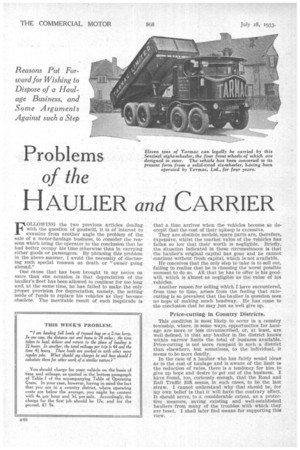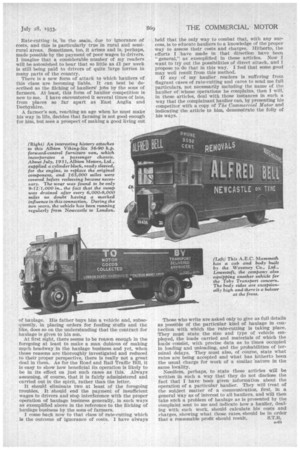Problems of the
Page 66

Page 67

If you've noticed an error in this article please click here to report it so we can fix it.
HAULIER and CARRIER FOLLOWING the two previous articles dealing with the question of goodwill, it is of interest to examine from another angle the problem of the sale of a motor-haulage business, to consider the reasons which bring the operator to the conclusion that he had better occupy his time otherwise than in carrying either goods or passengers. By phrasing this problem in the above manner, I avoid the necessity of discussing such special reasons as death or "owner going abroad."
One cause that has been brought to my notice on more than one occasion is that depreciation of the haulier's fleet has been allowed to continue for too long and, at the same time, he has failed to make the only proper provision for depreciation, namely, the setting aside of funds to replace his vehicles as they become obsolete. The inevitable result of such ineptitude is that a time arrives when the vehicles become so decrepit that the cost of their upkeep is excessive. They are obsolete models, spare parts are, therefore, expensive, whilst the market value of the vehicles has fallen so low that their worth is negligible. Briefly; the situation indicated in these circumstances is that the haulier's original capital has gone and he cannot continue without fresh capital, which is not available.
He conceives that the only step to take is to sell out failing to realize that he is choosing the worst possible moment to dose. All that he haste offer is his goodwill, which is almost as negligible as the value of his vehicles.
Another reason for selling which I have encountered, from time to time, arises from the feeling that ratecutting is so prevalent that the haulier in question sees no hope of making much headway.. He has come to the conclusion that he may just as well give up.
Price-cutting in Country Districts.
This condition is most likely to occur in a country township, where, in some ways, opportunities for haulage are more or less circumseribed, or, at least, are well defined, in that any haulier in the district knows within narrow limits the total of business available. Price-cutting is not more rampant in such a district thau elsewhere, but sometimes, to the individual, it seems to be more deadly, • In the case of a haulier who has fairly sound ideas as to the cost of haulage and is aware of the limit to the reduction of rates, there is a tendency for him to give up hope and desire to get out of the business. I have found, too, curiously enough, that the Road and Rail Traffic Bill seems, in such cases, to be the last straw. I cannot understand why that should be, for my own belief is that it will have the contrary effect. It should serve, to a considerable extent, as a protective measure, saving existing and well-established hauliers from many of the troubles with which they are beset. I shall later find means for supporting this view.
Rate-cutting is, in the main, due to ignorance of costs, and this is particularly true in rural and semirural areas. Sometimes, too, it arises and is, perhaps, made possible by the payment of poor wages to drivers. I imagine that a considerable number of my readers
will be astonished to hear that so little as per week is still being paid to drivers of quite large lorries in many parts of the country.
There is a new form of' attack to which hauliers of this class are becoming liable. It can best be described as the filching of hauliers' jobs by the sons of farmers. At least, this form of haulier competition is new to me. I have encountered it several times of late, from places so far apart as East Anglia and Derbyshire.
A. farmer's son, reaching an age when he must make his way in life, decides that farming is not good enough for him, but sees a prospect of making a good living out
of haulage. His father buys him a vehicle and, subsequently, in placing orders for feeding Stuffs and the like, does so on the understanding that the contract for haulage is given to his son.
At first sight, there seems to be reason enough in the foregoing at least to make a man dubious of making much headway in the haulage business and yet, when those reasons are thoroughly investigated and reduced to their proper perspective, there is really not a great deal in them. As for the Road and Rail Traffic Bill, it is easy to show how beneficial its operation is likely to be in its effect on just such cases as this. Always assuming, a course, that it is fairly administered and carried out in the spirit, rather than the letter.
It should eliminate two at least of the foregoing troubles. It should end the payment of insufficient wages to drivers and stop interference with the proper operation of haulage business generally, in such ways as exemplified above in the reference to the filching of haulage business by the sons of farmers.
I come back now to that class of rate-cutting which is the outcome of ignorance of costs. I have always held that the only way to combat that, with any success, is to educate hauliers to a knowledge of the proper way to assess their costs and charges. Hitherto, the efforts I have made in that direction have been "general," as exemplified in these articles. Now I want to try out the possibilities of direct attack, and I propose to do that in this way. I feel that some good may well result from this method. If any of my haulier readers is suffering from flagrant cases of rate-cutting and cares to send me full particulars, not necessarily including the name of the haulier of whose operations he complains, then I will,' in these articles, deal with those instances in such a way that the complainant haulier can, by presenting his competitor with a copy of The Commercial Motor and indicating the article to him, demonstrate the folly of his ways.
Those who write are asked only to give as full details as possible of the particular kind of haulage in connection with which the rate-cutting is taking place. They must state the size and type of vehicle employed, the loads carried and materials of which the loads consik, with precise data as to times occupied in loading and unloading, and the probabilities of terminal delays. They must also, of course, state what rates are being accepted and what has hitherto been the usual charge for work of a similar 'nature in the same locality.
Needless, perhaps, to state these articles will be written in such a way that they do not disclose the fact that I havebeen given information about the operation of a particular haulier. They will treat of the subject matter of a communication, first, in a general way as of interest to all hauliers, and will then take such a problem of haulage as is presented by the complaint sent to me and indicate how a haulier, dealing with such work, should calculate his costs and charges, showing what those ratea should be in order
that a reasonable profit should result. S.T.R.




































































































